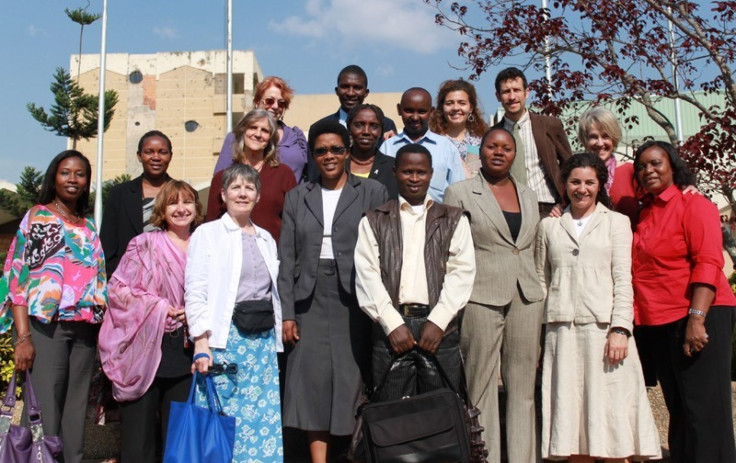Rwanda: The Only Government in the World Dominated by Women
ANALYSIS

Women have made significant advances in politics over the past few decades, with females having served as the head of state in many prominent countries, including Britain, India, Germany, Pakistan, and others.
However, males tend to outnumber females in most parliaments (democratically-elected or otherwise) around the world.
Indeed, there is only nation on earth in which females represent the majority of parliamentarians – and the identity of this state may be highly surprising.
In 2008, just fourteen years after a horrific genocidal civil war killed an astounding 800,000 people in a three-month period of unspeakable bloodshed, the tiny central African nation of Rwanda elected the world's first women-dominated legislature.
While Rwanda’s post-genocide Constitution set aside at least 30 percent representation for women in parliament, they initially held 44 out of 80 seats (a 55 percent rate).
During the 2008 election, a Rwandan female voter named Anne Kayitesi explained to BBC: The problems of women are understood much better, much better by women themselves. You see men, especially in our culture, men used to think that women are there to be in the house, cook food, look after the children... but the real problems of a family are known by a woman and when they do it, they help a country to get much better.
Women also grabbed one-third of all cabinet positions as well as the plum jobs of Supreme Court chief and speaker of parliament.
As of November 2011, 56.3 percent of the Rwandan parliament comprised women, making it, by the far, the most female-friendly national legislature on the planet, according to the Inter-Parliamentary Union (IPU).
Women have also apparently taken a key role in restoring the nation's economy, particularly its coffee-growing sector (with scarce natural resources nor much manufacturing, agriculture is the dominant sector).
In the wake of the devastating 1994 war, Rwandan women have aggressively moved to the forefront of rebuilding the nation.
In 2008, Agnes Matilda Kalibata, minister of state in charge of agriculture, told western media: Rwanda's economy has risen up from the genocide and prospered greatly on the backs of our women, Bringing women out of the home and fields has been essential to our rebuilding. In that process, Rwanda has changed forever. . . . We are becoming a nation that understands that there are huge financial benefits to equality.
Indeed, there are many reports of women in Third World countries, including Rwanda, making better decisions than men with regard to household investments, family finances, etc.
Winnie Byanyima, director of the United Nations Development Program's gender team, once told reporters: We have overwhelming evidence from almost all the developing regions of the world that [investment in] women make better economics.”
The women must be doing something right.
While many nations in the west are mired in recessionary conditions, Rwanda's economy expanded by 8.8 percent in 2011, and is expected to climb another 7.5 percent this year, according to Central Bank Governor Claver Gatete.
Between 2001 and 2010, the country's economy doubled in size, the World Bank stated.
In a vote of confidence, the U.S. government agreed last month to ratify a new trade pact with Rwanda.
The U.S. Trade Representative Ron Kirk praised Rwanda's economic recovery.
I am proud to participate in the ratification of this treaty with our Rwandan partners, he said in a statement.
This treaty will strengthen our two countries' economic ties and enhance the confidence of U.S. investors in Rwanda, as well as Rwandan investors in the United States. It will also help to promote the new investment that is critical to Rwanda's economic development. We see Rwanda as a leader in seeking to transform its economy through open trade and investment. We hope that the U.S.-Rwanda bilateral investment treaty will serve as a model for future agreements with other African countries.
According to reports, trade between Rwanda-U.S. reached $51-million in 2010.
However, it could be argued that Rwandan women took control of their country's affairs simply because they had no other choice.
Indeed, following the 1994 slaughter, so many men (both Tutsis and Hutus) were killed, that the country's gender profile tilted heavily in favor of women – reportedly, by a 60-40 percent basis.
By 1999, when women proved themselves adept at starting up and operating profitable businesses, property laws were amended to permit female ownership of land and other assets. Crucially, Rwandan women also gained the right to inherit property.
The very perception of women in Rwanda seems to have also dramatically improved.
Last year, Daphrose Nyirasafali, national program officer for UNFPA, the UN's family planning and reproductive health organization, told Britain’s Guardian newspaper: There used to be a lot of rapes, wife beating, male domination of women, boys sent to school and not girls. That has all changed, even in the countryside.
Interestingly, according to the IPU, of the ten parliaments with the highest current female representation, only five are in the developed countries (Andorra, Sweden, Iceland, Finland and Norway).
Perhaps even more startling, a significant number of African countries show up among the top twenty nations (aside from Rwanda, there is a heavy female presence in the governments of South Africa, Angola, Mozambique, Seychelles, Tanzania and Uganda).
Among some of the dominant western countries, female representation is surprisingly low: France (18.9 percent); United Kingdom (22 percent); Greece (17.3 percent) and the United States (16.8 percent).
© Copyright IBTimes 2024. All rights reserved.





















